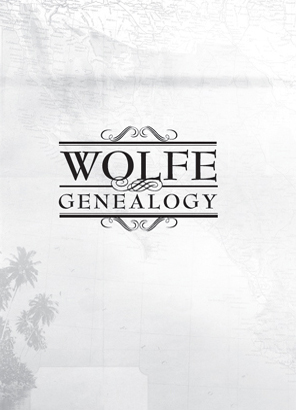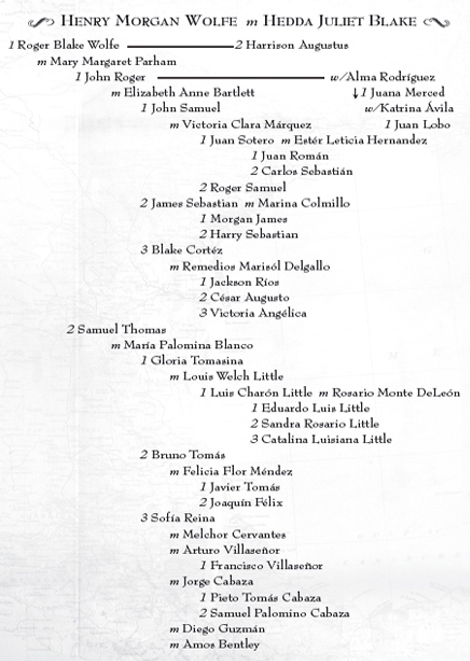Country of the Bad Wolfes (2 page)
Read Country of the Bad Wolfes Online
Authors: James Blake
Â
OTHER WORKS
BY JAMES CARLOS BLAKE

The Killings of Stanley Ketchel
Handsome Harry
Under the Skin
A World of Thieves
Wildwood Boys
Borderlands
Red Grass River
In the Rogue Blood
The Friends of Pancho Villa
The Pistoleer
Â
Â
Therefore, since the world has still
Much good, but much less good than ill,
And while the sun and moon endure
Luck's a chance, but trouble's sure,
I'd face it as a wise man would,
And train for ill and not for good.
â
A. E. Housman
, A Shropshire Lad

We may be through with the past, but the past ain't through with us.
â
P
AUL
T
HOMAS
A
NDERSON
, Magnolia

What country more dear or defiant than that of our own blood?
â
A
NONYMOUS

No hay reglas fijas.
â
A PRECEPT OF LONG STANDING ALONG THE LOWER
R
IO
G
RANDE

Â
Â

T
he family landed in the Western Hemisphere in the person of Roger Blake Wolfe, who arrived with a price on his head. No likeness of himâa sketch, a painting, a daguerreotypeâsurvived through the generations, and the accepted description of him as handsome was based solely on the family's penchant for romantic fancy and the genetic testament of their own good looks. Even his own sons never knew him in the flesh.
As a matter of record, Roger Blake Wolfe was born in London in 1797. His father was Henry Morgan Wolfe, an Irishman of murky lineage who triumphed over that disadvantage of birth to become a British naval officer and then managed the even more heroic achievement of marrying into a wealthy Knightsbridge family named Blake. Henry Wolfe had high ambitions for his son in the Royal Navy, but Roger, who loved the sea but abhorred regimentation, did not share them. When he ran away at age sixteen, absconding from a maritime academy, his father disinherited him through an announcement in the
Times.
Thirteen years later Roger Blake Wolfe was a pirate captain of some notoriety, one of the last of a breed near to extinction by the early 19th century. His ship was named either the
Yorick
or the
York Witch
, the former name appearing in some reports and court documents, the latter in others. Although he restricted his freeboot to the waters off Iberia and West Africa and never attacked an English vessel, the British in 1826 acceded to diplomatic imperatives and joined with various aggrieved nations in posting a reward for his capture, dead or alive. Whereupon Captain Wolfe decided to distance himself from that part of the world. Three of the crew's Englishmen chose not to go with him and he put them ashore near Lisbon with enough money to make their way home. The first mate said he understood their feelings. He said
it was a hard thing to say goodbye forever to one's home country. Captain Wolfe laughed at that and said it wasn't so hard when one's home country wanted to hang one. And set sail across the Atlantic.
Fifteen leagues shy of Nantucket the ship was struck by a ferocious storm and foundered. Only Roger and two of his crew survived the sinking, clutching to a spar in that plunging frigid sea. The storm at last abated during the night but one of the crewman succumbed to the cold and slipped off into the darkness. Shortly afterward the spar suddenly shook in a phosphorescent agitation and the other crewman vanished, his scream lost to the depths. Roger did not see the shark that took him. Through the rest of the night he expected to be attacked too but was not. The following day broke clear and sun-bright on a calm sea, and by wondrous chance he was spotted by an American whaler bound for home. His fingers had to be pried from the spar and it was hours more before his shivering began to ease under a heavy cover of blankets and sizable doses of rum. He was landed in New Bedford and his adventure condensed to a newspaper item in which he claimed to be Morgan Blake and described the lost ship as a Dutch cargo carrier.
It is anyone's guess how he occupied himself during the next year or what took him to Portsmouth, New Hampshire, where in October of 1827 and under his true name he married Mary Margaret Parham, who at the time believed he was a merchant ship master. Six weeks later he sailed away to southward and she never heard from him again. Six months after his departure she bore his twin sons. The boys were a year old when she received notice of their father's execution in Mexico.

Archives in Veracruz contain a variety of documents pertaining to Roger Blake Wolfe's arrest in a waterfront cantina on Christmas Eve of 1828 and his ensuing trial and conviction on charges of piracy and murder in Mexican waters. In keeping with protocol, the British Consulate provided a Mexican attorney for his defense and afterward concurred with the court's verdict. For reasons unrecorded he was sentenced to be shot rather than hanged, the usual and more ignominious fate of condemned pirates.
The morning of his execution on the first day of February, 1829, was reported to be clear and mild. The central plaza raucous with parrots and marimba bands, with vendors hawking melon slices and coconut milk. The air tanged with the smell of the gulf. The large crowd was composed of every social class and in a mood even more festive than usual for an executionâperhaps, as one newspaper surmised, because of the novelty of the condemned man's Anglo nationality. When Roger was trundled to the plaza in a donkey cart amid the tolling of steeple bells and made to stand against the church wall in front of the firing squad, there were catcalls and whistles but also much comment on his undaunted demeanor and striking figure. His clothes were fresh-laundered, his beard in neat trim, his hatless black locks tied in a horse tail at his nape.
A diversion occurred when a pair of young women at the fore of the crowd, each claiming to be Captain Roger's true sweetheart, got into a skirt-hiking scuffle to the delight of the nearest male witnesses. It was said that the pirate himself seemed amused by this contest over his affections. In a valediction rendered through an interpreter, he assured the two girls that he loved them both to equal degree, a sentiment that stirred the crowd to murmurs of both grudging approbation and high skepticism. He gave one of the girls his gold earring and the other a finger ring set with a pearl in the shape of a skull. When he bequeathed his remaining credit at a cantina called Las Sirenas toward as many drinks as it would buy for the regular patrons of that establishment, there were loud cheers of “Viva el capitán!” from the corner of the plaza where that disreputable bunch was assembled.